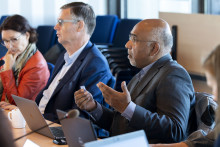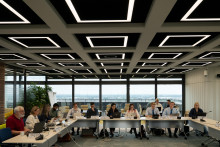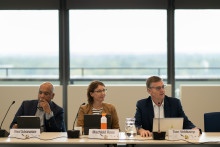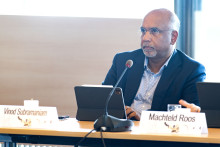The Executive Board is not unhappy with the internationalisation letter recently sent by Dijkgraaf. This emerged during the University Council Wednesday morning. The minister leaves room for interpretation and regional tailored measures. 'The letter is much more nuanced and comprehensive than I expected,' said president Vinod Subramaniam. 'But the devil is in the details. And we don't know most of the details yet. Also, it remains to be seen what Parliament thinks of the letter. There is one big advantage: we are on the table with the ministry.'
The letter shows that Dutch should regain a more prominent place in higher education. According to Dijkgraaf, all international students should at least learn Dutch, although the question remains to what extent. Although the UT has English as its formal language, in practice the university is bilingual, Subramaniam stressed during the University Council. 'That is why we are going to re-evaluate our language policy.'
C2 level
For the language of instruction it is more complicated, the president continued. Most studies at the UT are fully in English, with many courses taught by international lecturers. What will be the language requirements for this group, Subramaniam questioned aloud. 'We cannot expect them to master Dutch at C2 level. That is unachievable and not realistic. I have been here for 19 years and even I am not at that level.'
University Council chair Herbert Wormeester wanted to know where the Executive Board draws a red line when it comes to the language policy. What is possible, what is not? The board could not say much about that yet. Still, rector Tom Veldkamp did emphasise again that too high language requirements for the international teaching staff are not realistic. 'You don't want to overburden people with language. We already advise everyone to learn Dutch. But we are not going to test people or put language requirements in employees' contracts.'
New reality
In addition, the rector stressed that the choice of language at the UT is ultimately decided by the programmes themselves. 'We as Executive Board do not make that decision. I also believe that something like that should not be regulated centrally, as the ministry now proposes. Besides, don't forget that in all Dutch-language programmes many subjects are taught in English. That is the reality.'
Both the president and rector said they were comfortable with the current letter. 'We are an international university,' Subramaniam concluded. 'International staff and students are incredibly valuable and more than welcome. Period. But we are facing a new reality. I think we are going to succeed in changing things. We are a learning organisation, nothing is set in stone.'







